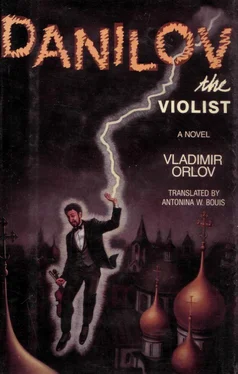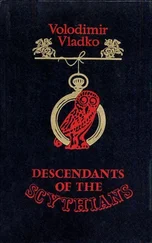"Young man," Danilov said, "do you place such a cheap price on your ladies -- three rubles apiece? As for your proposition, thanks anyway, but it sounds like a lousy deal."
"What?" The boy lurched forward and practically grabbed him by the lapels.
The other boy also frowned and took a step forward.
"What?" shouted the fellow in the fox hat. He unbuttoned his leather coat, and his white knit scarf fell to the ground. "I'll show you! ... We'll show you! ... Let's go outside!" he ordered Danilov.
Danilov wouldn't have gone, but he realized that if reports were written up on this incident and they eventually reached the theater, the place of action -- a beer hall -- would automatically put Danilov's morals in question. Even if they believed that Danilov was in the right, there still would be a cloud of suspicion. A cultural worker, and look where he was brawling...
"Let's go," Danilov said with a sigh.
Danilov was in a daze; it seemed as if everything was being done without him. The gang was dragging him, their drunken eyes left him no hope. Danilov could have handled two or three boys, but there were more of them, and even the girls were shouting militantly. On the right Danilov saw a knife in someone's hand... The group tightened around him.
"You bastard!"
Danilov dropped his skis, pushed the boy away, and moved the link on his bracelet.
Passersby and people at their windows, who had hoped to see something interesting, were amazed by the turn of events. Not only was there no killing, but also the boys suddenly seemed transformed into children's social workers whose main goal was moral order and spiritual perfection. With exclamations of apology they rushed to pick up Danilov's skis, but there weren't enough to go around.
"I won't detain you any longer," Danilov said.
As he reached his apartment house, he remembered the article by the critic Zabyvalov. It's a good thing he hadn't lost his head as he just had with the teenagers and responded to Zabyvalov by using his bracelet link. It wasn't Zabyvalov's fault. He had merely showed himself loyal to the futecon movement. Nothing else. Maybe he even sincerely meant what he wrote in the review. Maybe he really thought that the stage and auditorium of the House of Culture of Medical Workers had been turned over to bad musicians. Well, whether that was so or not, the fact remained that the futecons were annoying Danilov. Still, he had to put up with it for now.
32
As Danilov opened his door, he was singed by the foreboding of evil. Something had happened or was about to happen. His apartment radiated heat and a foul smell. Danilov rushed to the kitchen, and there on the table on a porcelain platter, which someone had taken from the dish cupboard, lay a lacquered card with crimson signs. After a second, Danilov got up the courage to walk to the table and read the blazing words: "Time X. Tonight. Quarter to one. Banny Alley trolley station. House 67."
"Well, that's it," thought Danilov and sat down on a stool. The lacquered note vanished; it was no longer needed. "That's it," Danilov repeated to himself.
He didn't have much time. He'd need twenty-five minutes or so for the streetcar. Maybe more. They didn't run frequently at that hour, and he'd have to wait at least fifteen minutes. In cases like this it would not do to call a taxi.
Danilov looked over his earthly disposition and letters, which he had prepared on the eve of his duel with Karmadon. He was satisfied with them. Klavdia might even remember him with warm feelings. But, of course, what did it matter to him?
Natasha... he should call her. But Danilov could not pick up the phone receiver. He walked up to it, but then walked away from it. Not only because he was so upset, not only from fear of hurting Natasha. He also was afraid that his call might endanger her. Actually, how much could a farewell call add to Valentin Sergeyevich's evidence against him?
Danilov picked up the receiver.
Natasha did not answer right away; she must have been having trouble with her sewing machine or perhaps with the marquisette blouse, which had urgently been commissioned by a woman engineer, a friend of the Muravlyovs. Natasha sounded tired.
"Natasha," Danilov said, trying to sound firm but stammering nevertheless, "thank you for everything. Not another word."
He hung up.
Danilov's viola was at the theater in the fireproof locker, so he went over to the piano and began playing. He did not know what he was playing; his hands moved automatically. It was the music of despair.
At ten to twelve, Danilov got up, looked through his papers once more, and caressed the cover of his piano. His touch was light, fleeting. He no longer had any ties to the instrument -- the instrument had lost its sound. Danilov put on his coat and hat, made sure all the lights were out, checked the gas, slowly locked up, and rang for the elevator.
33
The streetcar, as Danilov had predicted, took a long time to come. It was chilly and damp. The snow had melted toward evening. At last the streetcar came. It had a new type of automatic dispenser. Danilov put in a five-kopeck coin and pulled the metal handle, but the ticket didn't come out. Danilov turned toward the only passenger, who was not sober and apparently was meditating on his nonsobriety. Danilov said guiltily, "It won't give me a ticket."
"Ah!" the passenger said with a wave of his hand. He did not look at Danilov, however.
"Is that Rostovtsov?" thought Danilov. No, the passenger was there by chance, a gloomy man who drank out of grief or habit. "I never went to the police!" Danilov remembered. Now the case of his viola would become one of the unsolved cases mat would be a blot on Precinct 58's record. This cheered Danilov a bit.
"Why am I worrying about trifles?" Danilov thought. "Only two stops to go. I should be thinking lofty thoughts." And here Danilov realized something -- the idea, of course, should not have been new to him: He was being observed. They could see everything. His every thought and impulse, however brief and insubstantial, were clear to them. How humiliating to realize that! What torment! Even if now he used sheer willpower to calm himself, that moral tension would be seen and analyzed.
The streetcar reached Banny Alley.
Danilov got up. Without knowing why, he looked over uncertainly at the contemplative passenger. The passenger did not look up. "What if he misses his stop?" Danilov thought.
"Excuse me, please," Danilov said. "Where are you getting off? You might end up in the parking garage."
"Don't miss your stop!" the man said almost as a challenge. "You're the one who has to get off, not me. Get off, and they'll take you to the parking garage anyway. But there are chandeliers there..."
Danilov turned up his collar. He felt chilly. The clock on the corner of Bolnichny Alley showed twenty-four to one. Along the next block, a streetcar rattled on its tracks, apparently headed to Rostokino for a rest. "Is that drunk the last human I will ever see?" thought Danilov glumly. He had nine minutes of earthly existence left; house 67 stood a hundred yards away.
House 67, like its neighbor, house 69, had three stories, and a tall arch leading into the courtyard on the left. In the arch about seven yards from the sidewalk was the door Danilov was looking for. Once upon a time there had been a house on the left of house 67, and the door in the archway had led to a steep staircase. But fifteen years ago the old house had been razed, and replaced with a soft-drink stand and a basketball court, though now the backboards were warped, the hoops bent, and a table was set up in the middle of the court for aficionados of dominoes and hard drinking. The door to the razed house remained, however. It had not been boarded up, and if you went up the three steps of the former stoop, you could open the door and step into the sky.
Читать дальше












